The Advantages of using Plastic Pallets Over Wooden Pallets
Date Posted:3 September 2024
Plastic pallets offer a range of advantages over wooden pallets, making them a compelling choice for many businesses.
In the world of logistics and warehousing, choosing the right type of pallet can significantly impact operational efficiency, safety, and cost-effectiveness. While wooden pallets have traditionally been the go-to option for many businesses, plastic pallets are emerging as a superior alternative. Here’s a closer look at why plastic pallets might be the better choice for your operations and the distinct advantages they offer over their wooden counterparts.
Durability and Longevity
One of the standout features of plastic pallets is their durability. Unlike wooden pallets, which are susceptible to splintering, cracking, and general wear and tear, plastic pallets are designed to withstand harsh conditions. Made from high-density polyethylene (HDPE) or polypropylene, plastic pallets are resistant to moisture, chemicals, and temperature fluctuations. This makes them ideal for environments where pallets are exposed to extreme conditions or where hygiene and cleanliness are paramount.
The longevity of plastic pallets also means that they offer a better return on investment over time. While the initial cost may be higher, their extended lifespan and resistance to damage can lead to lower long-term costs compared to wooden pallets, which often require frequent replacement.
Hygiene and Cleanliness
Hygiene is crucial in many industries, particularly in food and pharmaceutical sectors. Plastic pallets excel in this area due to their non-porous surface, which does not absorb liquids or harbour bacteria. Unlike wooden pallets, which can absorb spills and become breeding grounds for microbes, plastic pallets are easy to clean and sanitise. They can be washed down with water or cleaned using industrial detergents, ensuring that they meet stringent hygiene standards and reducing the risk of contamination.
Additionally, plastic pallets are less likely to harbour pests like insects or rodents, which can be a concern with wooden pallets. This further enhances their suitability for environments where cleanliness is critical.
Lightweight and Easy to Handle
Plastic pallets are generally lighter than wooden pallets, making them easier to handle and transport. This reduced weight can lead to lower shipping costs and less strain on employees who need to move and stack pallets. Despite their lighter weight, plastic pallets are designed to be robust and capable of handling significant loads, providing a balance between ease of use and strength.
The lighter weight of plastic pallets also contributes to improved ergonomics in the workplace. Employees can handle plastic pallets more comfortably, which can help reduce the risk of musculoskeletal injuries and improve overall workplace safety.
Consistency and Quality
Plastic pallets offer superior consistency and quality compared to wooden pallets. Each plastic pallet is manufactured to precise specifications, ensuring uniformity in size, strength, and performance. This consistency is beneficial for automated systems and processes, as it reduces the risk of discrepancies that can occur with wooden pallets, which may vary in quality due to natural imperfections.
The uniformity of plastic pallets also facilitates easier integration with other logistics and storage systems, such as conveyor belts and automated handling equipment. This can lead to more efficient operations and fewer disruptions in the supply chain.
Environmental Impact
When it comes to environmental considerations, plastic pallets have their own set of advantages. Many plastic pallets are made from recycled materials, and they can themselves be recycled at the end of their life cycle. This contributes to a circular economy and reduces waste.
While wooden pallets are biodegradable, the environmental impact of deforestation and the disposal of damaged pallets can be significant. Plastic pallets, on the other hand, offer a more sustainable option when they are produced from recycled plastics and can be recycled or reused multiple times.
Cost-Efficiency Over Time
Although the initial cost of plastic pallets is higher than wooden pallets, they offer better cost-efficiency over time. Their durability and longer lifespan mean fewer replacements and lower maintenance costs. Additionally, the ease of cleaning and sanitising reduces the need for costly repair or replacement due to contamination.
The reduced risk of product damage and contamination, along with lower shipping and handling costs due to their lightweight nature, further enhance the cost-effectiveness of plastic pallets.
Versatility and Customisation
Plastic pallets come in a variety of sizes, shapes, and designs, allowing for greater flexibility and customisation to suit specific needs. Whether you require pallets for standardised loads or specialised applications, plastic pallets can be tailored to meet those requirements.
Customisation options include features such as adjustable entry points, reinforced corners, and specific load capacities. This versatility allows businesses to optimise their pallet usage for various applications and improve overall operational efficiency.


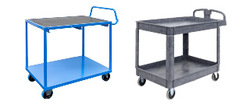
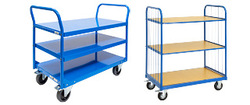
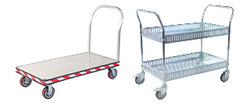

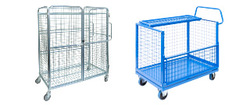
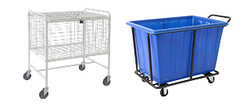
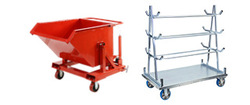

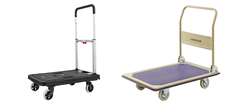
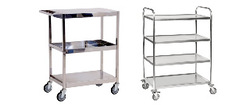
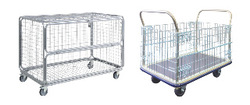

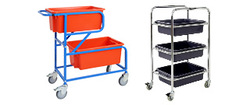
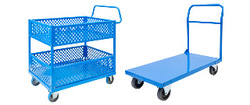
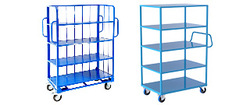
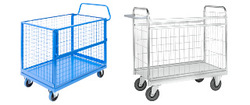
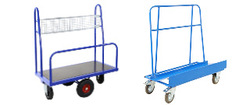
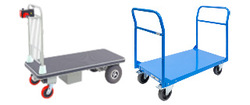


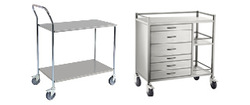
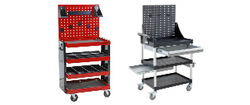
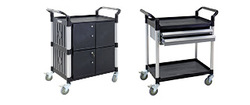
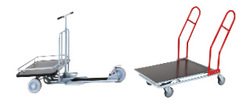
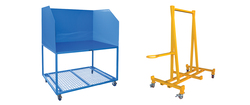



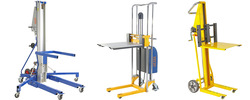



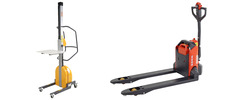

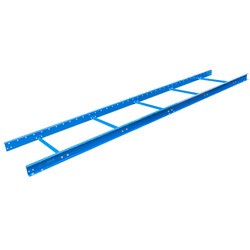
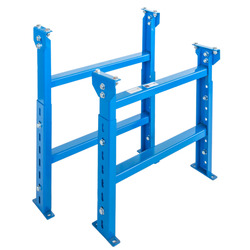
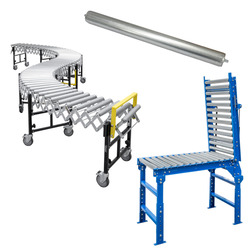
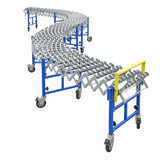


















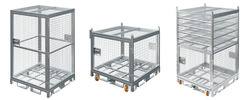

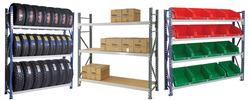
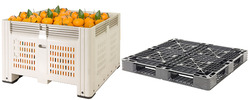
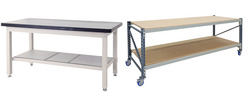
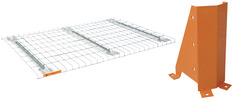
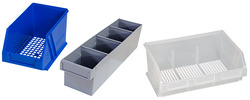

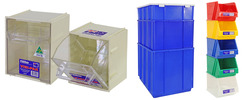

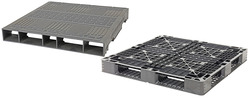

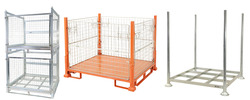
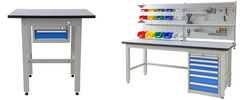
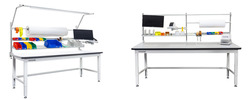






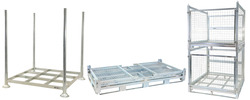
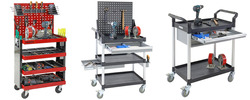
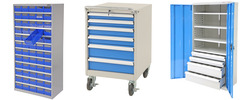













 Trolleys / Hand Trucks
Trolleys / Hand Trucks 2 Tier Trolleys
2 Tier Trolleys 3 Tier Trolleys
3 Tier Trolleys Aluminium Trolleys
Aluminium Trolleys Appliance & Hand Trucks
Appliance & Hand Trucks Cage Trolleys
Cage Trolleys Cleaning Carts & Trolleys
Cleaning Carts & Trolleys Construction Trolleys
Construction Trolleys Dollies
Dollies Foldable Trolleys
Foldable Trolleys Hospital Trolleys
Hospital Trolleys Laundry/Linen Trolleys
Laundry/Linen Trolleys Load Skates & Tow Tugs
Load Skates & Tow Tugs Mail / Office Trolleys
Mail / Office Trolleys Multi Purpose Trolleys
Multi Purpose Trolleys Multi-Tier Shelf Trolleys
Multi-Tier Shelf Trolleys Order Picking Trolleys
Order Picking Trolleys Panel Cart Trolleys
Panel Cart Trolleys Platform Trolleys
Platform Trolleys Powered Trolleys
Powered Trolleys Shopping Trolleys
Shopping Trolleys Stainless Steel Trolleys
Stainless Steel Trolleys Tool Trolleys
Tool Trolleys Utility Carts
Utility Carts Warehouse Trolleys
Warehouse Trolleys Custom Trolleys
Custom Trolleys Lifting Equipment
Lifting Equipment Forklift Attachments
Forklift Attachments Jib Attachments
Jib Attachments Lifting Hoists & Pallet Hooks
Lifting Hoists & Pallet Hooks Manual Stackers & Lifters
Manual Stackers & Lifters Pallet Jacks
Pallet Jacks Pallet Lifters
Pallet Lifters Pallet Rotators & Dispenser
Pallet Rotators & Dispenser Powered Pallet Trucks & Electric Lifters
Powered Pallet Trucks & Electric Lifters Scissor Lift Trolleys and Tables
Scissor Lift Trolleys and Tables Conveyor Equipment
Conveyor Equipment Conveyor Frames
Conveyor Frames Conveyor Stands
Conveyor Stands Roller Conveyors
Roller Conveyors Skate Wheel Conveyors
Skate Wheel Conveyors Access Equipment
Access Equipment Container & Yard Ramps
Container & Yard Ramps Step Stools & Ladders
Step Stools & Ladders Work Platforms & Crane Cages
Work Platforms & Crane Cages Drum Handling
Drum Handling Drum Storage & Bunding
Drum Storage & Bunding Drum Trolleys & Lifters
Drum Trolleys & Lifters Forklift Drum Handling
Forklift Drum Handling Containment & Spillage
Containment & Spillage Aerosol Cans Storage Cages
Aerosol Cans Storage Cages Bunded Pallets & Storage
Bunded Pallets & Storage Corrosive Goods Storage Cabinets
Corrosive Goods Storage Cabinets Flammable Liquid Cabinets
Flammable Liquid Cabinets Forklift Gas Storage Cages
Forklift Gas Storage Cages Gas Cylinder Storage
Gas Cylinder Storage Site Storage
Site Storage Spill Kits
Spill Kits Stillage Cages
Stillage Cages Waste Handling
Waste Handling Bin Lifters & Tippers
Bin Lifters & Tippers Plastic Waste Bins and Carts
Plastic Waste Bins and Carts Steel Waste and Tipping Bins
Steel Waste and Tipping Bins Storage Equipment
Storage Equipment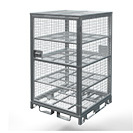 750 Series Cage Configurations
750 Series Cage Configurations Heavy Duty Cabinets & Benches
Heavy Duty Cabinets & Benches Heavy Duty Shelving
Heavy Duty Shelving Mega Bins & Pallets
Mega Bins & Pallets Packing Benches
Packing Benches Pallet Racking Accessories
Pallet Racking Accessories Parts Trays & Stor-Pak Bins
Parts Trays & Stor-Pak Bins Pegboard & Louvre Panels
Pegboard & Louvre Panels Plastic Bins
Plastic Bins Plastic Handling Solutions Bins
Plastic Handling Solutions Bins Plastic Pallets
Plastic Pallets Stack & Nest Bins
Stack & Nest Bins Storage Cages
Storage Cages Workplace Equipment
Workplace Equipment Workbenches
Workbenches Modular Workbenches
Modular Workbenches Electric Height-Adjustable Workbenches
Electric Height-Adjustable Workbenches Floor Matting
Floor Matting Industrial Weighing Scales
Industrial Weighing Scales Pallet Wrapping & Packaging Machinery
Pallet Wrapping & Packaging Machinery Ramps
Ramps Stationery Cupboards
Stationery Cupboards Storage and Stillage Cages
Storage and Stillage Cages Tool Trolleys
Tool Trolleys Tooling Cabinets
Tooling Cabinets Wheelie Bins
Wheelie Bins Workshop Equipment
Workshop Equipment Safety Equipment
Safety Equipment Gloves and PPE
Gloves and PPE Pallet Rack Post Protectors
Pallet Rack Post Protectors Safety Barriers & Bollards
Safety Barriers & Bollards Safety Knives & Cutters
Safety Knives & Cutters Signs and Traffic Supplies
Signs and Traffic Supplies Tool & First Aid Boxes
Tool & First Aid Boxes Construction Equipment
Construction Equipment Concrete Equipment
Concrete Equipment General Site Equipment
General Site Equipment Lifting Equipment
Lifting Equipment Site Storage
Site Storage Waste
Waste 










